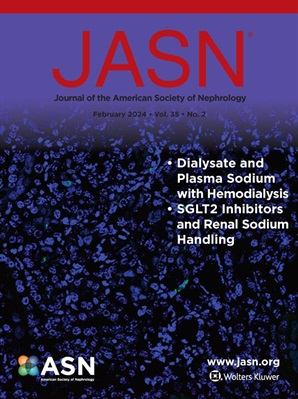Network Interactions of Circulating FGF23, HRG-HMGB1, and Cardiac Disease in CKD.
IF 10.3
1区 医学
Q1 UROLOGY & NEPHROLOGY
引用次数: 0
Abstract
BACKGROUND Genome-wide association studies (GWAS) have identified numerous genetic loci associated with mineral metabolism markers but have exclusively focused on single-trait analysis. In this study, we performed a multi-trait analysis of GWAS (MTAG) of mineral metabolism, exploring overlapping genetic architecture between traits to identify novel genetic associations for fibroblast growth factor 23 (FGF23). METHODS We applied MTAG to variants common to GWAS of 5 genetically correlated mineral metabolism markers in European-ancestry participants. We integrated UK BioBank GWAS for blood levels for phosphate, 25-hydroxyvitamin D, and calcium (n=366,484) and CHARGE GWAS for parathyroid hormone (n=29,155) and FGF23 (n=13,716). We then used supervised and unsupervised deep machine learning to identify novel associations between genetic traits and FGF23. RESULTS MTAG increased the effective sample size for mineral metabolism markers to n=50,325 for FGF23. After clumping, MTAG identified independent genome-wide significant SNPs for all traits, including 62 loci for FGF23. Many of these loci have not been previously reported in single-trait analyses. Through a functional genomics approach, we identified Histidine-rich glycoprotein (HRG) and high-mobility-group-box 1 (HMGB1) as master regulators of downstream canonical pathways associated with circulating FGF23, and both genes were highly enriched in hypertrophied cardiac tissue of deceased hemodialysis patients. In addition, we found DNMT3A was associated with uremic toxin, 8-Hydroxy-2-deoxyguanosine, a biomarker of DNA damage. In silico gene perturbation analysis revealed DNMT3A is protective in patients with heart failure caused by hypertrophied or dilated cardiomyopathy. CONCLUSIONS Our findings highlight the importance of MTAG analysis of mineral metabolism markers to boost the number of genome-wide significant loci for FGF23 to identify novel genetic traits. Functional genomics revealed novel networks that inform unique cellular functions and identified HRG-HMGB1 as key master regulators of FGF23 and cardiovascular disease in CKD.CKD患者循环FGF23、HRG-HMGB1与心脏疾病的网络相互作用
背景全基因组关联研究(GWAS)已经确定了许多与矿物质代谢标志物相关的遗传位点,但只集中在单性状分析上。在这项研究中,我们对矿物质代谢的GWAS (MTAG)进行了多性状分析,探索性状之间的重叠遗传结构,以确定成纤维细胞生长因子23 (FGF23)的新遗传关联。方法:我们对欧洲血统参与者中5种遗传相关的矿物质代谢标志物的GWAS常见变异进行了MTAG分析。我们整合了UK BioBank GWAS检测血液中磷酸盐、25-羟基维生素D和钙的水平(n=366,484), CHARGE GWAS检测甲状旁腺激素(n=29,155)和FGF23 (n=13,716)。然后,我们使用监督和无监督深度机器学习来识别遗传性状与FGF23之间的新关联。结果smtag将FGF23的矿物质代谢标志物有效样本量增加到n=50,325。聚集后,MTAG鉴定出所有性状的独立全基因组显著snp,包括FGF23的62个位点。这些基因座中有许多以前没有在单性状分析中报道过。通过功能基因组学方法,我们确定了富组氨酸糖蛋白(HRG)和高流动性组盒1 (HMGB1)是与循环FGF23相关的下游典型途径的主要调节因子,这两个基因在已故血液透析患者的肥大心脏组织中高度富集。此外,我们发现DNMT3A与尿毒症毒素、8-羟基-2-脱氧鸟苷(DNA损伤的生物标志物)有关。基因微扰分析显示DNMT3A对肥厚或扩张型心肌病引起的心力衰竭患者具有保护作用。结论我们的研究结果强调了MTAG分析矿物质代谢标记对于增加FGF23全基因组显著位点数量以鉴定新的遗传性状的重要性。功能基因组学揭示了告知独特细胞功能的新网络,并鉴定出HRG-HMGB1是CKD中FGF23和心血管疾病的关键主调节因子。
本文章由计算机程序翻译,如有差异,请以英文原文为准。
求助全文
约1分钟内获得全文
求助全文
来源期刊
CiteScore
22.40
自引率
2.90%
发文量
492
审稿时长
3-8 weeks
期刊介绍:
The Journal of the American Society of Nephrology (JASN) stands as the preeminent kidney journal globally, offering an exceptional synthesis of cutting-edge basic research, clinical epidemiology, meta-analysis, and relevant editorial content. Representing a comprehensive resource, JASN encompasses clinical research, editorials distilling key findings, perspectives, and timely reviews.
Editorials are skillfully crafted to elucidate the essential insights of the parent article, while JASN actively encourages the submission of Letters to the Editor discussing recently published articles. The reviews featured in JASN are consistently erudite and comprehensive, providing thorough coverage of respective fields. Since its inception in July 1990, JASN has been a monthly publication.
JASN publishes original research reports and editorial content across a spectrum of basic and clinical science relevant to the broad discipline of nephrology. Topics covered include renal cell biology, developmental biology of the kidney, genetics of kidney disease, cell and transport physiology, hemodynamics and vascular regulation, mechanisms of blood pressure regulation, renal immunology, kidney pathology, pathophysiology of kidney diseases, nephrolithiasis, clinical nephrology (including dialysis and transplantation), and hypertension. Furthermore, articles addressing healthcare policy and care delivery issues relevant to nephrology are warmly welcomed.

 求助内容:
求助内容: 应助结果提醒方式:
应助结果提醒方式:


